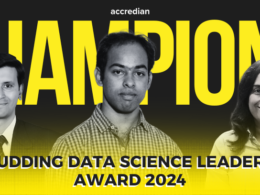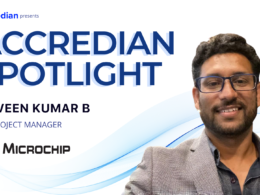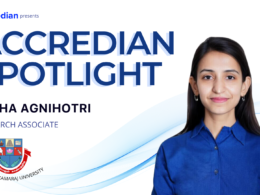At Accredian, we create accomplished and empowered Data Leaders. We groom our students to dominate the world of Data Science and AI and reshape their future. We value what our students bring to the table. We share their vision and support them during their journey and ensure that they carve a niche for themselves.
We’re proud to have tutored exceptional students all across India. Today, one such exceptional student, Nilesh Joshi stands in the spotlight.
Student Name: Nilesh Joshi
Current Organization: Barclays
Batch: CDF – August 2019
Total years of experience: 19.5 years
Malvika: Hi Nilesh, before we begin, could you tell us more about your current work profile?
Nilesh: I have about 19.5 years of overall IT experience.
Over the years, I played various roles whether it is Delivery or Product Management, pre-sales or Product Engineering.
When we talk about Delivery Management, I mean project management, program management, setting up and executing the project and all that. So that experience is really vast in my career.
The second part is Product Engineering so I’ve also been a part of product development into Business Intelligence space so identifying those niche or whitespace areas within the BI Area and automating those.
And the third is pre-sales where we have to keep on working on various solutions and managing client interactions. My experience has been in the BI/ Data warehousing area so obviously, I have been pretty much involved in the technology side as well.
You can say that I’m a Techno-Managerial kind of a person with a lot of experience in management and equally hands-on into technology.
Malvika: What got you interested in Data Science & Machine Learning?
Nilesh: So the majority of my experience has been into BI/Data Warehousing and Big Data as I said.
I’ve have been through a lot of data journeys in the past, I understand the datasets, data storage, data cleaning so what actually got me excited was not the hype.
We keep on hearing in the market that Data Science is a booming technology but since I have myself been hands-on with so many of these areas right than just reading a few articles and maybe gaining some knowledge. I decided to get to know the practical things.
Obviously, I don’t think I made any wrong decisions but my motivations were knowing the data so well and getting hands-on into Data Science at my level.
Malvika: What all tools and packages in Data Science & Machine Learning have you mastered in your Data Science & AI program at Accredian so far?
Nilesh: Let me be very transparent. When I started as part of the August Cohort it was a very tentative journey for me.
I was not sure whether I’ll be able to understand it properly because I was always worried that this is more on the Mathematics/Statistics side. Obviously, after school and very minimally in college you usually don’t work on all this mathematical aspect of Data.
So when I was taking up those concepts again and starting to rethink how it can be applied to the data, I was very worried when I started this cohort. I was very much doubtful initially but Suchit started very well and the starter kits were also very important for me to get that initial understanding and gain confidence that I am indeed ready.
That’s how I got started with Python and Jupyter Notebooks.
I can say I’m pretty much comfortable now in terms of coding, I’ve learned a lot of libraries. Obviously, the cohort and classes give us quality insights and the path forward but eventually, it ends up on how much you’re practicing and what you want to do.
Because you have to explore more and more, you cannot just rely on code all the time. So yeah, learning Python and exploring various libraries was my main agenda.
I have, on my own, designed my pace. If you really ask me, the cohort may have completed a few more algorithms or models, like Random Forest but my confidence is still in Linear Regression because I don’t want to run faster than I intend to.
I’m actually ramping up at my own pace and also ensuring that whatever I’m doing I am thoroughly invested into it.
Malvika: What is the goal of Data Science and how has the field evolved in the past few years?
Nilesh: So the primary reason we pursue Data Science is that nowadays, we are actually running into Data Deluge.
By that, I mean data is coming from all angles, whether it is IoT, whether it is your existing systems, you have data-at-rest, you have data-in-motion.
Due to this data deluge, usually, organizations build a Data Lake and this Data Lake is a dump all the data that you have in your organization, but the question is how do you build value from this data?
Now there are various tools that allow you to process the data.
So probably, you can create dashboards in Tableau but the whole idea of Data Science is that you’re not only just relying on what you have, as part of your claim query but you’re actually applying some statistical methods to your data, gaining those insights, which you cannot just directly get from your databases, queries and all that stuff.
So applying statistical algorithms, finding relationships between the data, what data is useful and what is not; Data Science is used for providing these kinds of additional value on top of traditional methodologies.
People have been relying a lot on traditional data, queries, and other stuff, but like I said Data Science introduces us to applying algorithms and models; first of all, understanding in what scenario, which models work and what is important.
Once you know that, you have to move to continuous research in terms of how can your model be better because it’s not a one-time exercise! If you start building a model, you have to keep on revisiting your model, applying various parameters, seeing what difference does it bring to the outcome and eventually it will end up in the reporting phase where you create either some good dashboard either in Tableau or do EDA and then present your findings.
The insights that Data Science is providing now is very much complimenting the growth of data in real-time. This is where I think the combination of Big Data and Data Science is very crucial.
Malvika: What are the current trends in Data Science that you are most excited about?
Nilesh: What I understand from these cohorts and even with my little 3-4 months of experience in Data Science, one of the areas where we tend to spend majority of our time is EDA, we have to perform that Exploratory Data Analysis, figure out the various patterns in the data, how to deal with outliers, and all this stuff.
Now we’re hearing something called automated Data Science, which is going to actually automate most of our EDA phase. Now, one of the major areas, which excites me and is key to Data Science is Feature Engineering.
So when we talk about Feature Engineering, it’s about identifying those variables and how your input and output variables will help you reach the goal you want to reach.
The goal of Data Science and ML algorithms is to predict certain values; for that, you need certain variables. Now those variables can be your input variables and output variables.
The output variable is your target; input is something that will help reach that target. Now, if data gets automated and the initial part of the Data Science which is EDA, that comes to the picture, identification of these variables, which is a manual process currently, will get impacted a lot via automation.
And I think I’m waiting to see how much automation it can bring and what value it brings to the table.
So, that is something which is exciting.
The second part is Data Privacy and Security because one part of what even I’m seeing at this moment as a lot of data is getting generated, the field of Data Privacy and Security is growing by leaps and bounds so that data marketing can be proper. And by way of Data Science, we do not lose the value of the data and still can derive the right incentives.
Malvika: Which are some of the blogs that you follow?
Nilesh: I often read Medium actually.
I have taken subscriptions as well and I ensure that I read one or two articles in a day, whatever time permits.
Apart from Medium, KD Nuggets is a good blog too. It covers a lot of impactful and informative stories.
Malvika: At Accredian, students are encouraged to build high-quality GitHub profiles. Have you built a GitHub portfolio and how do you think this will help you?
Nilesh: I think it is very, very important to have a very strong GitHub profile as well.
I attended those sessions on both GitHub profiles and Resume building conducted by Accredian.
While I do realize how critical that is and my takeaways from those sessions, I’ve started building both assets slowly but steadily.
Malvika: Accredian’s mission is to groom Data Leaders of tomorrow, what do you understand by a Data Leader? And how do you think a Data Leader is different from a Data Scientist?
Nilesh: So when you talk about Data Scientists, right, it belongs to a very vast field.
A Data Leader would actually take care of the overall data strategy. He has to oversee everything from data storage, data processing, to the reporting space including the data visualization aspect.
When you’re looking at any particular thing as a Data Leader, you have to include the end-to-end journey of data into the picture and not only one particular area.
Data Science would be one of those critical components of this entire data journey and that’s how I would look at Data Scientists.
Malvika: What is your advice to anyone wanting to start a career in Data Science?
Nilesh: Based on my experience Malvika, there are two things that come to mind.
I have 19.5 years of experience already been into a Delivery Management role, where I’m managing large teams, executing various programs so getting into a technical, hands-on role whether that would be the right move for my career or not. That is one of the deliberations I found myself having.
The second was how much stats and mathematics would I be spending time on?
So these two aspects should be pondered upon whenever someone’s planning to get into this kind of role.
First of all, people should forget what background or what baggage they are carrying and be able to start with a very clean mind over here.
Your experience is going to do lots of value-add in terms of understanding things but at the same time we’re getting to a new subject, so you have to have a clean mindset and not limit yourself to what you know and what you don’t know.
Start with a clean slate, and start filling that plate with whatever you’re learning. And in addition to whatever guidance an institute like Accredian provides, it is up to individuals also to put additional effort, get into it, and keep all the fears away.
Nothing is impossible. I mean, with me having such a long career, but still, I’m very much motivated and enthusiastic today to learn something new every day. That gets built over time, that was not the case initially.
So we have to give every new field some time and can keep all the fears aside.
Malvika: How has your journey with Accredian been so far? Do you have any comments on how the curriculum has been structured, the faculty and the support team?
Nilesh: The starter kits and curriculum has been very useful.
It’s great that you have made it mandatory to go through those starter kits before beginning the program.
The initial confidence-building comes from the starter kit. They are extremely user-friendly.
Also, Suchit conducted excellent training as he started the course. If Suchit hadn’t trained us the way he did, my motivation would have gone down for sure.
To maintain that continuity, to keep the motivation at all times high, he has done a fabulous job. And I’m very grateful for that!
When Lavi picked up from where Suchit had left, that was also fascinating. Overall, the faculty is talented and friendly; they do not get impatient even with the most basic of queries. If the timelines are maintained, we would be looking at great collaborations!
Malvika: Thank you for your time, Nilesh. All the best for your future!





